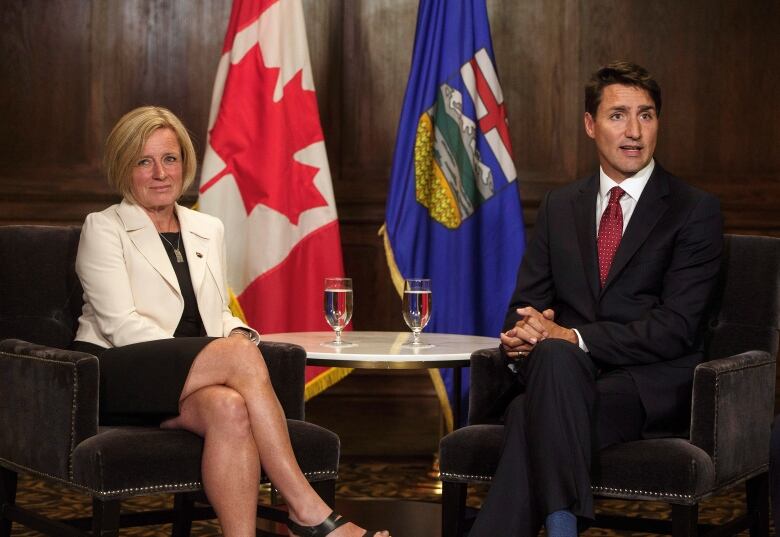At oilsands official opening, Alberta premier talks Trans Mountain timeline
Lack of pipelines continues to cost Canada $40 million a day, Rachel Notley tells Fort McMurray audience

Alberta Premier Rachel Notley says the challenges facing the Trans Mountain pipeline expansion show her province can do everything by the book and still get shortchanged.
Notley said Monday the recent Federal Court of Appeal decision quashing the expansion project has provoked frustration and anger in Alberta, but her government will continue to fight to get the pipeline built.
Without the pipeline, ongoing bottlenecks will continue to cost Canada $40 million a day in a discounted price for oil, Notley said.
The premier was in FortMcMurrayon Monday for the official opening of Canada's newest megaoilsandsproject.
Alberta Energy Minister MargaretMcCuaig-Boydand federal Natural Resources Minister AmarjeetSohialso touredthe $17-billion Fort Hill mine and processing facility, which came online earlier this year.
- After delayed start-up, Fort Hills mine achieves first oil
- Suncorgets boosted stake in Fort Hillsoilsandsproject in dispute settlement
The Fort Hills project took five years to build.The project is a joint venture that involves Suncor, the majorityowner, Vancouver-basedmininggiantTeckResources and French multinational Total S.A.
It was shelved in 2008 during the global financial crisis andresurrected in 2013.
The project, 90 kilometres north of FortMcMurray, is expected toproduce 194,000 barrels ofoil a day.
Fort Hills, an open-pit mine with a life expectancy of50 years, began producingoil in January and hasbeen ramping up production since.
The site is the size of a small town. It accommodates 2,000 employees and comes with shops, places to eat,two movie theatres and two gymnasiums.
- 'It was,' Alberta premier says of meeting with Trudeau over Trans Mountain
- Premier Rachel Notley pulls Alberta out of federal climate plan over Trans Mountain ruling
The Appeal Court ruled the federal government did not consult properly with First Nations and did not take into account the impact of tanker traffic on marine life.

The Alberta government has repeatedly said the lack of pipeline access forces producers to sell exclusively to the U.S. market at a substantial price reduction.
Prime Minister Justin Trudeau has said his government is considering all options to get the project restarted. Notley met with Trudeau last week in Edmonton and said the prime minister promised her a new timeline within weeks.
Suncoroptimistic about Trans Mountain
Suncor CEO Steve Williams also waded into pipeline politics at Monday's ceremony.
Williams said he was disappointed by thefederal court decision but remains confident the pipeline will eventually get built.
"I am still optimistic about it," Williams said. "I still think this pipeline will get constructed. So, I think in the mid and long run, there are still significant growth opportunities"
The company said it has already secured pipeline space to transport bitumen, so the Trans Mountain delay will have no impact on Fort Hills.
On Monday, themine was producing 150,000 barrels per day, short of the goal.
Thecompanysaid it hopes to be running at full capacity by the end of the year.
Fort Hills a step forward for carbon cutting
Williams said Fort Hills heralds an era, where the production of a barrel of oil has a similar carbon footprint to oil produced in the United States.
"That's a big step forward for the industry," he said. "We can compete with the best in the world."
Oil produced by Fort Hills has a lower emissions rate, he said, because it uses a process to extract bitumen that doesn't require upgrading.
with files from The Canadian Press












_(720p).jpg)


 OFFICIAL HD MUSIC VIDEO.jpg)
.jpg)



























































































